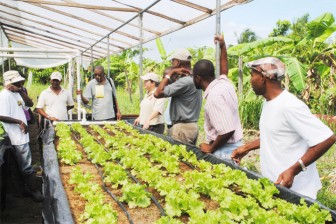It may be early days yet for Guyana’s small but animated community of hydroponic farmers currently benefiting from a Shadehouse Vegetable Production and Marketing Project, but the potential for the further popularization of the project and perhaps the eventual securing of overseas markets has already begun to energize participants.
On Tuesday more than 40 conventional farmers who appear to have become converts of the shadehouse technology gathered in the Savannah Suite of the Pegasus Hotel for what the organizers described as an Assembly of Hydroponic Vegetable Producers. The project has attracted the patronage of several multilateral support agencies including Partners of the Americas.

Speaking at the meeting, Grenada-born Canada-based Director of Caribbean Self Reliance International (Casri) Franklyn Harvey said the organization had engaged the Committee of Ethics in the Fight Against Hunger and For Life (COEP), which had indicated that drought-hit communities of north-eastern Brazil may be interested in sharing the low-level technology adopted by farmers here in pursuit of their hydroponics initiative.
Harvey said that according to COEP, the need for fresh vegetables in communities in north-east Brazil was significant. The two organizations are to meet again to continue discussions.
Brazilian interest – given the huge market in northern Brazil alone – may be enough to generate much greater enthusiasm for shadehouse cultivation in Guyana, though officials associated with the project concede that production is nowhere near the level that would trigger any short-term contemplation of overseas markets.
At the Pegasus assembly much of the emphasis was on recognizing the initiative taken by the shadehouse adherents. Quite apart from the considerations associated with planting vegetables off the ground, the farmers recognize that the controlled environment that gets around issues of weather and pests allows them to make an argument for the health considerations associated with hydroponically grown vegetables.
Harvey is optimistic that the expansion of the shadehouse method can do positive things for agriculture in Guyana. He points out that the cultivation of healthier foods can open access to new and bigger markets since both inside and outside the region there was an awareness of the importance of healthy eating. “The market for healthier foods has been growing steadily in the Caribbean,” Harvey said.




